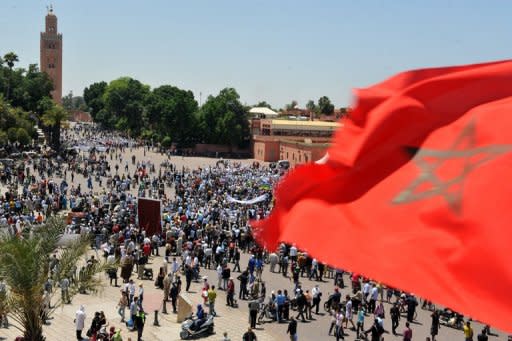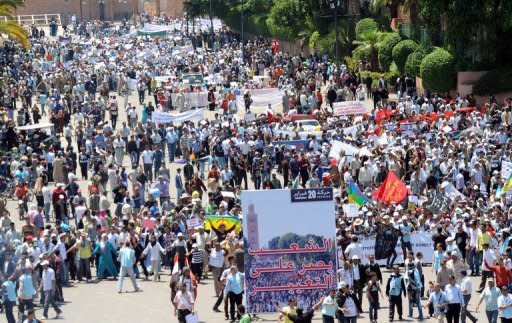Thousands march in new Marrakesh anti-terror protest
Thousand of demonstrators staged a new protest in Marrakesh Sunday to denounce last month's bomb attack here and to call for democratic reforms as the best way to combat violence. The marchers made their way from the city centre to Djemaa El Fna square, where 17 people, including 13 foreigners, died in the April 28 bombing of the Argana cafe, a popular tourist haunt. The demonstrators, waved placards reading: "No to terrorism", "A king who reigns but does not govern," "For a new Constitution" or "No to corruption". They numbered more than 7,000 according to an AFP correspondent; between 2,500 and 3,000 according to the interior ministry. It was the second such protest in two days. On Saturday, hundreds gathered in the same square to denounce extremist violence. Investigators meanwhile have been questioning three suspects in the bombing who were arrested on Thursday. Although Moroccan officials have said that the bombing bore the hallmarks of an Al-Qaeda attack, Al-Qaeda in the Islamic Maghreb (AQIM) denied any involvement in a statement put out via a Mauritanian news agency. On Friday, Interior Minister Taieb Cherkaoui said the main suspect had plotted the attack at his parents' home in the Atlantic port of Safi, 150 kilometres (90 miles) northwest of Marrakesh. All three suspects in custody "admire Al-Qaeda, are filled with Al-Qaeda ideology and with Salafist ideology," the minister added, in a reference to a radical Islamist movement. Although he did not name them, security sources have identified the main suspect was 25-year-old Adil El-Atmani. The other two suspects were Hakim Dah, 41, and Abdessamed Bitar, 28, said a senior security official. Most participants in Sunday's march were members of Morocco's February 20 Movement. Inspired by the pro-democracy protests that have rocked the Arab world since the end of last year, they are pushing for sweeping reforms in their country. The demonstration broke peacefully around 1330 GMT. "We are here to voice our solidarity with the citizens of Marrakesh, to demand a true democracy and reject personal power," 25-year-old Mohamed, from Beni-Mellal (centre-east) said. Another demonstration was due to take place later Sunday in the coastal city of Casablanca. In the wake of the movement's first demonstration on February 20, King Mohammed VI in March announced comprehensive constitutional reforms. He promised to guarantee the independence of the country's judicial system and strengthen the power of the prime minister. But Mina Bouchkioua, a teacher from Rabat and a February 20 Movement activist, dismissed the proposals as inadequate. Focus: Neighbours describe 'pious' Morocco bomb suspect "The king must not be at the centre of power there must be a separation of power," she said, calling on the government to resign. She did not trust the commission set up to look into implementing the reforms, she added. Demonstrators also denounced two of the king's closest aides: Mounir Majidi, the king's personal secretary; and Fouad Ali el Himma. Others banners in the march accused the Moroccan intelligence service, the DGST, of torture. This kind of criticism would have been unimaginable in Morocco just a few months ago.



